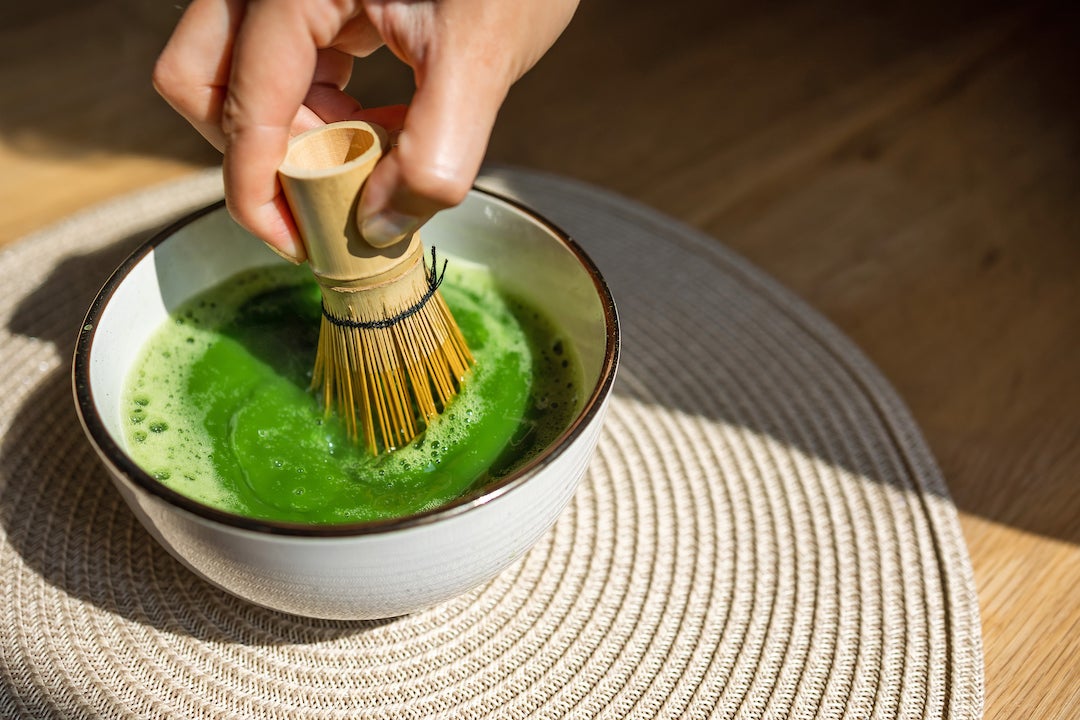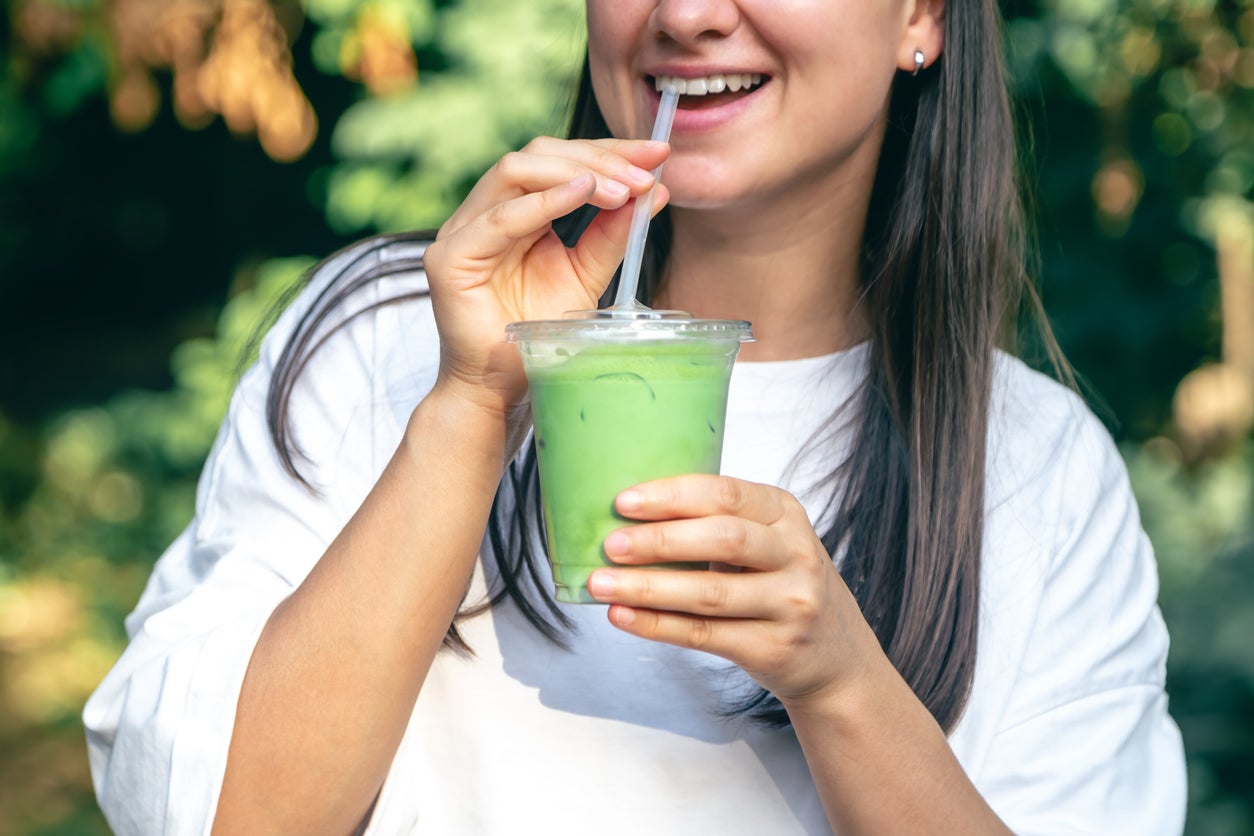The health benefits of matcha, explained by an expert
An expert explains how this ancient drink can reduce stress levels, prevent inflammation and more

Matcha has been around for thousands of years, with records of it being consumed in ancient China around 2700 BC. But the bright green tea has only recently gained popularity in the UK, where it’s filtered down from fitness influencers to the regular consumer.
According to research from Grand View, the UK’s matcha tea market generated a revenue of 45.3 million pounds in 2024 and is expected to reach 71.2 million by 2030. Most coffee chains now offer a matcha latte or iced matcha latte, and demand is now so high that Starbucks reportedly experienced matcha shortages. Health food retailer Holland & Barrett also reported that matcha sales are up 77 per cent with gen-z leading the interest in matcha drinks to enjoy at home.
But aside from the striking green colour – which now dominates social media feeds – what makes the drink so popular? And is a matcha latte actually any healthier than a black tea or a coffee?
We asked Nichola Ludlam-Raine, a registered dietician and author of How Not To Eat Ultra Processed, to explain the matcha hype and unpack the benefits to our health.
What is matcha?
“Matcha is a type of powdered green tea made from specially grown and processed tea leaves,” says Ludlam-Raine. Unlike regular green tea, where the leaves are steeped and then discarded, with matcha, you’re consuming the whole leaf, which means a higher concentration of nutrients and antioxidants. The leaves are grown in the shade, which increases the chlorophyll content, giving matcha its vibrant green colour.
Though matcha is a tea, it’s often mixed with whisked or foamed milk like a coffee, and matcha lattes are now available in the majority of coffee shops. Pure ceremonial-grade matcha is much more concentrated than other drinks you might find, which are blended with other ingredients for taste and consistency.
There is a big difference between the quality and type of matcha you’re getting on the high street and what you would get in a traditional Japanese tea ceremony, a practice that originated in China but has been a permanent part of Japanese culture since the 12th century.
“Ceremonial-grade” matcha is of a much higher quality and will always be labelled as such. Many brands don’t bother with using ceremonial grade for a simple latte or mix-at-home powder, however, some have gone the extra mile to ensure their matcha meets ceremonial standards. Pret recently informed The Independent that all its matcha is ceremonial grade and several other brands have followed suit and made the switch as consumers become more discerning and the drink continues to skyrocket in popularity.
Matcha isn’t just for drinking either. In its powdered form you might also find matcha in anything from cakes and ice cream to snack bars. You can find it in puddings, porridge and in ready-to-drink cans too.

What are the health benefits of matcha?
Mellow and creamy, matcha is a calming and comforting drink with a slightly bitter flavour. According to Ludlam-Raine, it is rich in antioxidants, particularly a group called catechins, which help protect cells from damage caused by free radicals. The most potent catechin in matcha, EGCG (epigallocatechin gallate), has been studied for its potential role in supporting heart health and reducing inflammation.
She adds that, “matcha also contains L-theanine, an amino acid that promotes relaxation, which can improve focus and alertness. However, it’s important to recognise that while matcha has these health-promoting properties, it should be part of a balanced diet and not relied upon as a sole source of nutrition.”
Many health-conscious consumers are now switching from coffee to matcha on the basis that the drink can provide mitochondrial support and improve focus without the jittery feeling and crashes that too much coffee can cause. Of course, for some people, there’s enough caffeine in matcha to prompt this feeling too, it depends on your tolerance and whether you usually consume caffeine.
Does matcha contain caffeine?
Matcha does contain a small amount of caffeine, typically 19–44mg of caffeine per gram (a normal serving is between 2-4 grams). But the amount of caffeine in matcha can vary based several variables including the quality and freshness of the leaves, the amount of powder you use and how long you brew it for – the longer you brew matcha, the more caffeine is extracted from the leaves.
Plenty of wellness influencers might claim that matcha is superior to coffee as a caffeinated drink because although it boosts energy and provides focus, it supposedly doesn’t produce the anxious feeling that too much coffee can elicit. However, this really depends on how many matcha drinks you consume in a day and your reaction to caffeine.
The purity will also have an effect here. If you’re drinking ceremonial-grade matcha mixed with water in large amounts, it may give you a much larger energy boost than a single low-grade matcha latte mixed with milk or plant milk.
Does matcha help with stress levels?
Ludlam-Raine also advocates for using matcha as just one of many tools to manage mental health. “Matcha may help with stress levels due to its L-theanine content,” she explains.
“L-theanine has been shown to promote relaxation without causing drowsiness, and it can balance the stimulating effects of caffeine, creating a calm, focused state. This combination is often why people find matcha less jittery than coffee.”
“However, it’s not a magic bullet for stress relief. Managing stress involves various factors like lifestyle, diet, and mindfulness practices, and while matcha can contribute, it should be seen as one small tool in the bigger picture of stress management.”
Is matcha better for you than coffee?
Due to the L-theanine levels in matcha, it’s generally considered better for gut health than coffee. Coffee is more acidic and is therefore harsher on the gut microbiome. Matcha also has prebiotic properties, which can reportedly help to reduce inflammation, bloating and stomach complaints that usually arise after drinking other caffeinated drinks.
Coffee does also offer health benefits and many health influencers sing the praises of drinks like bulletproof coffee – quality coffee with added butter and MCT oil. Coffee contains beneficial phenolic acids and flavonoids and several studies point to moderate consumption being beneficial for health.
However, anecdotally, many people agree that matcha offers better focus with fewer anxiety symptoms due to its added amino acids and slower caffeine absorption rate. The flavours of each drink are very different so at the end of the day, it’s down to personal preference. Neither drink will harm you and both have their benefits when enjoyed moderately and sensibly, says Ludlam-Raine.
Read more: The best air purifiers to help free your home from dust and allergens
Join our commenting forum
Join thought-provoking conversations, follow other Independent readers and see their replies
Comments



Bookmark popover
Removed from bookmarks